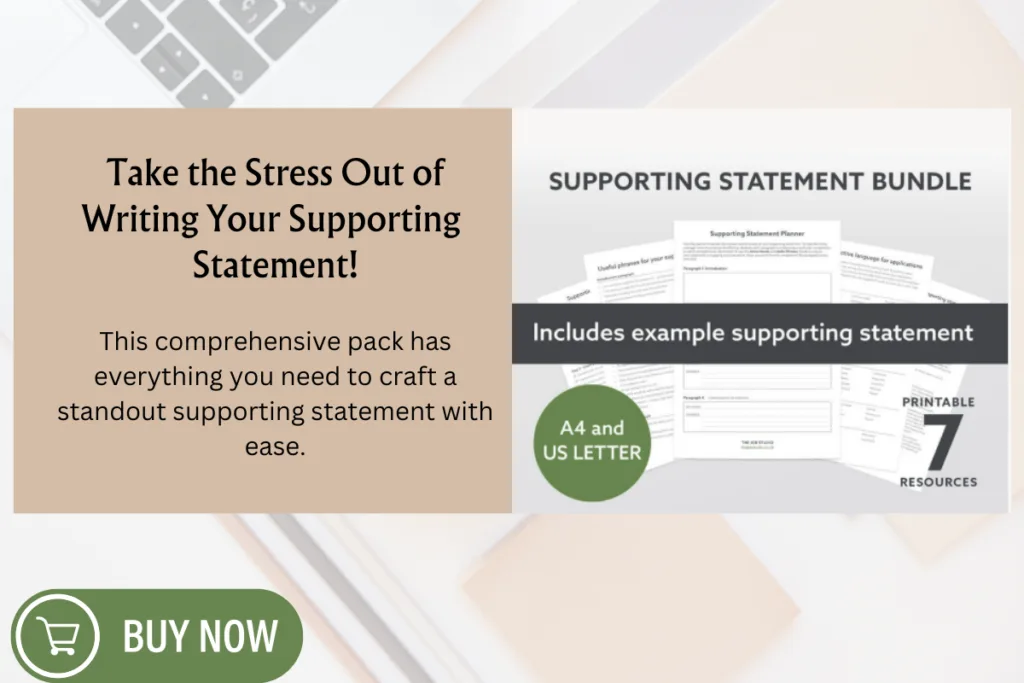What You’ll Gain
- Learn how to write an effective NHS supporting information statement that grabs attention.
- Discover examples and templates to simplify the writing process.
- Understand the common mistakes to avoid when filling out the NHS application form.
- Explore answers to frequently asked questions about NHS supporting information.
- Get tips on structuring and formatting your statement to stand out in 2025.
Download our full Supporting Statement Bundle
Introduction NHS Supporting Information
Are you ready to land your dream NHS job in 2025? One of the most critical steps in the application process is crafting a compelling supporting information statement.
This part of your application can make or break your chances of moving forward to the interview stage.
Imagine this: You’re confident in your abilities and your application, but your supporting statement lets you down because it’s generic or poorly structured.
That won’t happen to you after reading this guide. By the end of this post, you’ll have the tools to craft a statement that truly showcases your skills, experience, and alignment with NHS values.
Let’s dive in and create a statement that makes assessors excited to call you for an interview!
What is the NHS Supporting Information Statement?
The supporting information section of the NHS application form is your opportunity to:
- Showcase your skills and experience relevant to the job.
- Align yourself with NHS values like respect, diversity, and quality care.
- Explain how you meet the requirements in the job description and person specification.
Key takeaway: Think of your supporting statement as a persuasive story where you are the protagonist. It’s your chance to convince assessors you’re the perfect fit for the role.
How to Structure Your NHS Supporting Information Statement
To create a standout statement, break it down into these clear sections:
1. Introduction
Start with a strong opening that sets the tone. Highlight your enthusiasm for the role and briefly mention why you’re the ideal candidate.
2. Qualifications
Mention relevant degrees, certifications, and any additional training that aligns with the job requirements. Don’t just list them—connect them to the role.
3. Experience
Provide specific examples from your work history that demonstrate your ability to excel in the role. Focus on achievements and outcomes.
4. Skills
Highlight transferable skills such as teamwork, adaptability, and problem-solving. Show how these skills have led to tangible results in previous roles.
5. Alignment with NHS Values
Emphasize your understanding of and commitment to NHS values. Use specific examples to illustrate how you embody these values in your professional life.
6. Closing Statement
End with a confident summary that reinforces your suitability for the role. Thank the assessors for their time and express your excitement about the opportunity.
Seven Powerful Words and Phrases to Use
Using impactful language can make your statement more compelling. Here are seven phrases you should consider:
- Commitment to Quality Care: Example: “I am deeply committed to delivering high-quality care tailored to each patient’s needs.”
- Collaboration: Example: “I thrive in collaborative environments, working effectively with multidisciplinary teams.”
- NHS Values: Example: “I align strongly with NHS values, including respect, compassion, and inclusion.”
- Flexible and Adaptable: Example: “I am flexible and adaptable, ready to support the organization as needed.”
- Problem-Solving: Example: “I excel at problem-solving, addressing challenges proactively and effectively.”
- Respect and Diversity: Example: “I value diversity and treat everyone with respect, ensuring inclusivity in all my work.”
- Taking Ownership: Example: “I take ownership of my professional development to ensure I always deliver my best.
Example NHS Supporting Information Statement Template
Here’s an example template you can customize:
Thank you for the opportunity to apply for this role with the National Health Service.
Having reviewed the job description, I am confident my skills, experience, and values align perfectly with this role. Over the years, I have gained valuable experience in [specific duties], which have prepared me to deliver exceptional results.
For example, in my role as [Previous Job Title] at [Organization], I [specific achievement, e.g., implemented a new system that reduced patient wait times by 20%]. These experiences have honed my skills in [relevant skill, e.g., teamwork, problem-solving, or leadership].
In addition to my professional experience, I actively embody NHS values such as respect, diversity, and a commitment to quality care. I am passionate about making a positive impact in the lives of patients and contributing to the success of your organization.
Thank you for considering my application. I am excited about the opportunity to bring my expertise and dedication to your team.
While you can use a template, tailor each statement to the specific job description to stand out.
Checkout more examples in our downloadable Supporting Statement Bundle

Frequently Asked Questions (FAQs)
Ready to write your own standout NHS supporting statement? Download our supporting statement bundle below and get started today. Don’t forget to like, share, and comment if this guide has been helpful. Together, let’s make your dream NHS job a reality!
How do I start an NHS supporting statement?
Begin with a concise summary highlighting how your skills and experience align with the job’s person specification. Thank the employer for the opportunity and reference the job description. Mention key qualities or accomplishments that set you apart, such as specific expertise or achievements directly related to the role.
What should I include in my NHS supporting statement?
Include your main duties, relevant skills, voluntary work, understanding of NHS values, and explanations for any employment gaps. For example, under main duties, you could highlight managing patient care schedules or improving workflow efficiency—such as “I developed a system that reduced appointment wait times by 20%.” For relevant skills, you might include examples like “effectively handling conflict resolution during team meetings” or “leading a training program that enhanced team performance.” If referencing voluntary work, you could say, “While volunteering at a hospice, I organized events to improve patient morale.” For NHS values, mention specific actions that align with them, such as “I consistently treat colleagues and patients with respect by fostering an inclusive environment.” And for employment gaps, highlight growth opportunities, like “During my career break, I completed a diploma in healthcare management to better equip myself for leadership roles.”
How long should an NHS supporting statement be?
Aim for 500-1,000 words, depending on the job requirements. Ensure it’s concise but comprehensive. For example, if you’re applying for a nursing role, a focused 700-word statement could emphasize your patient care experience, teamwork, and ability to handle emergencies. If it’s a managerial role, closer to 1,000 words would allow you to detail leadership achievements, process improvements, and alignment with strategic goals, such as “streamlining patient intake processes to reduce wait times by 15%.” Tailor the length and content to match the complexity of the role.
How can I demonstrate NHS values in my statement?
Mention specific values such as respect, compassion, and a commitment to quality care, and provide examples of how you’ve demonstrated them in your work. For instance, you could describe a time when you ensured inclusivity in a team environment, like “During a multidisciplinary team meeting, I made it a priority to encourage input from all members, ensuring every voice was heard and valued, which led to a more comprehensive care plan for the patient.” Alternatively, highlight compassion by sharing a specific patient interaction: “While caring for an elderly patient with limited mobility, I took extra time to ensure they felt comfortable and respected, adapting my approach to meet their individual needs.”
Can I use the same supporting information for multiple NHS applications?
While you can use a template, tailor each statement to the specific job description to stand out. For example, if applying for a nursing role, emphasize specific achievements such as “During my time at XYZ Hospital, I developed a patient care program that improved recovery times by 15%.” For managerial roles, detail leadership experiences, like “I successfully led a team of 10 in implementing a new records management system, which reduced errors by 20%.” Tailoring ensures your statement resonates with the assessors and highlights your direct relevance to the role.
Related Blog Posts in This Series
This blog post is one of a series to help you craft the perfect supporting statement. Check out other posts in this series:
Supporting Statement for a Nursing Job or Healthcare Assistant Job with Examples.
How to Write a Personal Supporting Statement with ChatGPT
How to Write an NHS Supporting Statement




